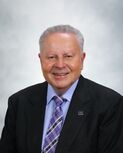 Cr Les Larke
Cr Les Larke CR LES Larke has long claimed to be the voice of financial prudence on the council, committed to getting “value for money” for the ratepayers of Bass Coast. But there is a growing gap between his words and his actions.
He is paid an allowance of more than $ 26,245 a year plus super to fulfil his duties as a councillor. Not a fortune for the average councillor who puts in 20-30 hours a week on committee work, policy workshops, training and representing the community.
But it’s a nice little earner for someone who’s just filling a chair. That pretty much describes Cr Larke’s contribution.
Much of the work of councillors is done on committees, both internal and external. Councillors share the workload and most serve on three or four.
His fellow councillor David Rooks already had five committees but picked up the access and inclusion committee to make it six.
Bass Coast Mayor Michael Whelan told the Post he was grateful to Cr Rooks (“It would have looked pretty bad if we didn’t have a representative on that committee”) but concerned about the workload he was carrying.
Cr Whelan declined to answer when asked whether Cr Larke was carrying his weight on the council.
| When the Post asked Cr Larke to explain, he responded “My choice for genuine reasons, and will review in 12 months.” He is rarely seen at public functions in the Bunurong ward and often skips briefings and workshops. He rarely speaks at council meetings and often votes against motions without explanation. As for financial prudence, it is apparently negotiable. At Wednesday’s council meeting he voted in favour of a motion to enable Phillip Island and San Remo residents to swap their 120-litre red landfill bin for a 240-litre bin during December and January free of charge. Residents can already get a larger bin but they must pay an additional charge of $59.20. | The council workload The Mayor carries the biggest committee burden but is also paid an allowance that recognises the workload. The deputy mayor is a substitute on several committees. The other councillors share the workload - not always equitably.
|
A council officer assessed the total cost at $1.6 million if all 28,000 households took up the offer.
The motion was defeated on the Mayor’s casting vote but if it had been passed it would have resulted in every ratepayer subsidising extra services for a few.
So much for financial prudence and the idea of user pays.